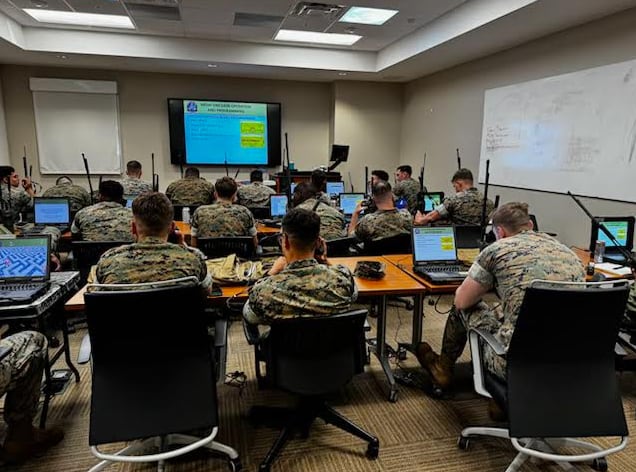Ongoing upgrades to Marine radios are like turning old radios from flip phone to smartphone-like capabilities.
As part of modernizing the Corps, the Marines have fielded more than 4,000 new radios across the force since October 2023 with a plan to upgrade a total of 50,000 radios in 2024.
The move seeks to add multichannel, cryptographic-compliant models to the legacy radio systems, according to a Marine Corps Systems Command release.
The effort aligns with the Pentagon’s 2020 Electromagnetic Spectrum Superiority Strategy, which prioritizes the electromagnetic spectrum as a pivotal aspect of modern warfare.
The Marine Corps’ Program Manager for Communications Systems oversees such radio upgrades and fieldings.
Richard Sessions, communications systems program manager, said, “In today’s Marine Corps operations, where combat often unfolds within the electromagnetic spectrum, our success relies heavily on maintaining effective communication across the fleet and with joint forces.”
He added that controlling the electromagnetic spectrum space is critical because it has a direct link on the deployment and maneuver of actual Marine units. Without encrypted communications, units can be detected, or communications intercepted.
The upgrade project announcement comes on the heels of a 2022 release in which Systems Command announced the work to field a new multichannel handheld radio system. The L3Harris Technologies Falcon IV/AN/PRC-163 won the 10-year, $750 million contract.
In 2021, Kelly Fletcher, the acting chief information officer for the defense department, announced a multiprong effort through the electromagnetic spectrum superiority strategy that included developing superior electromagnetic spectrum capabilities by investing in research and development to build systems that can survive in a complex spectrum environment.
In 2019, the Marine Corps began evaluating the AN/PRC-158 a man-packable, multichannel radio aimed to replace the AN/PRC-117G single-channel radio first fielded in 2011, according to a release.
The multichannel capability gave operators two radios in one.
“We began fielding in October, focusing on a specific domain while being mindful of the capabilities of multi-channel radios,” Sessions said. “In addition to their enhanced functionality, our priority was to transition to radios that meet cryptographic compliance standards mandated by the (National Security Agency).”
Once Marine Corps radios are in compliance, Sessions said, it allows the force to “operate securely across various frequencies and within a secure environment.”
The new multichannel radios give users a software-defined system that allows them to add new waveforms and cryptographic standards as those become available.
To avoid jamming, detection and to allow continuous communications, electromagnetic spectrum users must be able to adjust frequencies and channels rapidly in a variety of environments.
“The closest analogy to our current transition in radio technology is akin to moving from the era of flip phones to the advanced world of smartphones,” Sessions said.

Previously, the Corps purchased radios with fixed capabilities. If a new waveform or crypto standard was released, the device often couldn’t be upgraded, and the service would have to buy new hardware.
Much like smartphone technology, the upgrades allow users to add features to existing radios to keep them in service, Sessions said.
“Now, we’re shifting toward acquiring highly adaptable hardware radios that are not just modular but also capable of supporting new waveforms, marking a significant milestone in our communication capabilities,” he said.
Much of the recent work has incorporated Marine units and user feedback.
“Our team has conducted extensive testing and field user evaluations involving Marine units to ensure that our systems meet their needs,” said Stephanie Dodge, product manager at PM CS. “We provide them with the equipment, offer quick training sessions, and then seek their input on how they would use it, what improvements are needed, and what aspects need fixing.”
The multichannel, cryptographic-compliant deadline is Dec. 31.
Todd South has written about crime, courts, government and the military for multiple publications since 2004 and was named a 2014 Pulitzer finalist for a co-written project on witness intimidation. Todd is a Marine veteran of the Iraq War.








